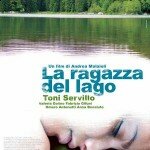The 2008 Lavazza Italian Film Festival has been taking a road trip to Palace cinemas across the country and will soon finish up in Adelaide and Perth. In its ninth year there are plenty of different choices to suit all foreign filmlovers’ tastes, from political drama Il Divo to the romantic Parlami D’amore (Speak To Me Of Love). Although Adelaide and Perth miss out (as did Canberra), the Cinecitta selection of classic Italian films included Federico Fellini’s Oscar-winning Amarcord and Tre Fratelli (Three Brothers) from Francesco Rosi. The most adorned film screening in the 2008 Festival is La Ragazza Del Lago (The Girl By The Lake).
With wins of three Nastri D’Argento awards, two Venice Film Festival awards in 2007 and a sweep of this year’s David Di Donatello awards (the Italian Oscars) with 10 wins, La Ragazza Del Lago has a lot riding on it. Adapted from the novel ‘Don’t Look Back’ by Norwegian crime writer Karin Fossum, the first of her Inspector Sejer series, it centres on a small, peaceful town in the Italian Dolomites where questions surface and uncertainty deepens in the aftermath of a naked body being found by the side of a lake. It seems a strange concept to convert a popular Norwegian crime novel into an Italian drama but because of the European success of this series it was likely deemed as feasible.

As well-liked local Anna’s death is investigated we see the chaos and confusion that she leaves behind on a small town. Inspector Giovanni Sanzio (Venice Best Actor winner Toni Servillo) comes in from the city as an outsider but as the film progresses we get glimpses of what really haunts him. Servillo takes this film and runs with it, giving us the anguish and anger of a cop who just wants to go home and spend time with his family. Both his dramatic and comedic moments are very polished, sharing some memorable banter with local weirdo Mario (Franco Ravera) and accused boyfriend Roberto (Denis Fasolo).
For Andrea Molaioli, the amount of pressure doubled by co-writing the screenplay (with Sandro Petraglia) along with directing his first feature. He handles it well, drawing on profile close-ups, particularly early on, along with entrances from right to left of screen. Within this context it makes the viewer wonder whether Molaioli is suggestively telling us there are two sides to every person. The good use of silence gives a feeling of dread as we find out secrets with the townspeople, while wide-angle shots are favourably used to frame the film; picturesque establishing shots remind us how secluded and tranquil the town is – and at the same time it sometimes leaves you feeling like you’re watching a tourism ad for the Italian countryside.

Character development is presented over a slow-moving plot as we are presented with the suspects, moving back and forth between them. To name names here would be unfair, but the wide range of subjects is a bonus for Molaioli as it gives him freedom to play around with the audience and keep us guessing. There are some particularly haunting scenes, including an unexpectedly intriguing scene of time passing over the examination of the crime scene. One of the winning di Donatellos was for special effects, single-handedly for this alone.
Conclusion:
La Ragazza Del Lago is a film well put together. There are solid performances, good twists in the story and a beautiful backdrop, and it leaves you contented but uncertain (the language barrier can have that effect). While Perth viewers miss out on this film, Adelaide audiences can catch it again on Sunday (26 Oct) at 6pm, while the Festival concludes in Adelaide and Perth on Wed Oct 29th.
*Look out for the Russian Film Festival hitting Palace cinemas across the country next month!*

 Follow the author Katina Vangopoulos on Twitter.
Follow the author Katina Vangopoulos on Twitter.














